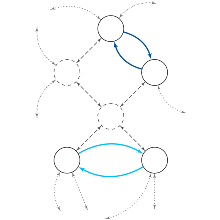It is in relation to the statistical point of view that the structure of the vital parts of living organisms differs so entirely from that of any piece of matter that we physicists and chemists have ever handled physically in our laboratories or mentally at our writing desks.''
E. Schrödinger, What is Life, 1944
Inference and stochastic thermodynamics
One of the guiding stars for stochastic thermodynamics is the ultimate goal of bringing the fundamental principles of thermodynamics together with the complex phenomena of living systems. In this light, we cannot hope to find elementary equations from which all explanations can be deduced. Instead, thermodynamic inference aims at combining the concepts of stochastic thermodynamics with the inductive approach to infer properties of some system that are not directly accessible. Our recent work explores what we can learn from given partial information of some underlying hidden dynamics, e.g. a complex (Markov) network that describes possible states of the physical system.
Related Publications
-
Thermodynamic Inference in Partially Accessible Markov Networks: A Unifying Perspective from Transition-Based Waiting Time Distributions, J. van der Meer, B. Ertel, and U. Seifert, Phys. Rev. X 12, 031025, 2022, Abstract, Download
- Time-resolved statistics of snippets as general framework for model-free entropy estimators, J. van der Meer, J. Degünther, and U. Seifert, Phys. Rev. Lett. 130, 257101, 2023, Abstact, Download
FIRST REMARK. Non-Markov is the rule, Markov is the exception.''
N.G. van Kampen, Brazilian Journal of Physics, vol. 28, no. 2, June, 1998
Beyond the Markov assumption
Nowadays, the framework of stochastic thermodynamics is well-established for Markovian systems, i.e., systems without any memory effects that are fully described by their current state. Extending these concepts to more involved models is the next step towards a thermodynamic understanding of complex systems and phenomena.
For example, the thermodynamic uncertainty relation is a quantification of the idea that increasing the precision of a certain process inevitably increases the thermodynamic cost, i.e., the dissipation or entropy production. While this relation is proved for Markov processes, the conceptual idea transcends this limited class of processes. We have investigated the generalization to semi-Markov processes, a more general class of processes that can include temporal memory effects.




